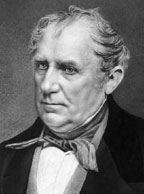Better than many of Cooper’s more famous works
 |
| James Fenimore Cooper |
The members of the Willoughby family are politely divided in their loyalties, with some favoring England and some the colonists. In fact, despite the Captain’s history in His Majesty’s Army, his sympathies tend toward the American cause. Cooper reminds us that the American Revolution was a civil war, as it took place in a nation where Rebels and Tories often lived side by side. Cooper depicts an additional dimension to the Revolution by showing it was also a class war. When news of the Declaration of Independence and “All men are created equal,” reaches the Willoughby estate, many of the family’s servants and subordinates begin to question why they’re serving this rich British master, and they hope that the conflict may offer an opportunity to confiscate his lands. At first it’s difficult to tell who will remain loyal to the Captain and who may betray him. As the novel progresses, hidden loyalties are gradually and surprisingly revealed. It’s particularly difficult to determine the allegiance of a long-time companion of the family named Old Nick, a Tuscarora Indian who during wartime goes by his warrior-chieftain name, Wyandotté.
The novel Wyandotté, originally published in 1843, covers some of the same ground as Cooper’s earlier and better-known novel The Spy, but covers it to much better effect. While The Spy and the famous Leatherstocking novels are intended to be action thrillers, Wyandotté is more of an attempt at a realistic depiction of what life was like on the American frontier at the time of the Revolution. The novel proceeds at a steady, measured pace, but is never boring. The political issues of the Revolution are related intelligently through the debates of the characters. For the most part, suspense is built not through physical action but through the decisions the characters are forced to make. When knives are drawn or guns are fired, such scenes are neither gratuitious nor overly romanticized, but rather the heroic actions of ordinary people placed under extraordinary circumstances in time of war. There are a couple of romantic subplots, but, unlike The Spy, they remain subplots and don’t dominate the book.
The American Revolution is a fascinating period in history, and no writer does it better than James Fenimore Cooper. Having read some of his previous works, I expected to like Wyandotté, but was nevertheless pleasantly surprised by how good it is. Written rather late in his career, Wyandotté displays the skill of a veteran author at the top of his game, one who has learned from his mistakes and ripened with age. This book not only deserves to be mentioned in the same breath as The Last of the Mohicans, in many respects it even surpasses that venerable classic.
If you liked this review, please follow the link below to Amazon.com and give me a “helpful” vote. Thank you.
http://www.amazon.com/review/R3I25YTNC7HIT6/ref=cm_cr_rdp_perm


This comment has been removed by a blog administrator.
ReplyDeleteThis comment has been removed by a blog administrator.
ReplyDeleteIt’s really a great post..I would like to appreciate your work and I am going to recommend it to my friends. Thanks for sharing.
ReplyDeleteThis comment has been removed by a blog administrator.
ReplyDeleteThis comment has been removed by a blog administrator.
ReplyDelete